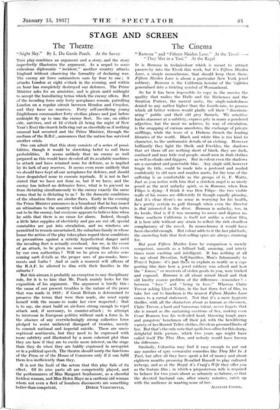STAGE AND SCREEN
The Theatre "Night Sky." By L. Du Garde Peach. At the Savoy Tars folay Combines an argument and a story, and the story imperfectly illustrates the argument. As a sequel to some ridiculous diplomatic " incident," another country attacks England without observing the formality of • declaring war. The enemy air force outnumbers ours by four to one ; it attacks London at eight o'clock in the evening, and within an hour has completely destroyed our defences. The Prime Minister asks for an armistice, and is given until midnight to accept the humiliating terms which the enemy offers. But of the invading force only forty aeroplanes remain, patrolling London on a regular circuit between Hendon and Croydon, and they have no reserves. Forty self-sacrificing young Englishmen commandeer forty civilian planes and just before midnight fly up to ram the enemy fleet. No one, on either side, survives, and at 12 o'clock (it being the night of New Year's Eve) the church bells ring out as cheerfully as if nothing unusual had occurred and the Prime Minister, through the medium of the B.B.C., announces that the nation has survived another crisis.
One can admit that this story consists of a series of possi- bilities, though it would be stretching belief to call them probabilities. It seems unlikely that an enemy so well prepared as this would have devoted all its available machines to attack and have retained none for defence, as is implied by its lack of any reserves. It seems even more unlikely that we should have kept all our aeroplanes for defence, and should have despatched none to execute reprisals. It is not in fact stated that we have not done so, but if we have, and the enemy has indeed no defensive force, what is to prevent us from dictating simultaneously to the enemy exactly the same terms that he is dictating to us ? In the domestic conditions of the situation there are similar flaws. Early in the evening the Prime Minister announces in a broadcast that he has issued an ultimatum to the country which shortly afterwards turns out to be the enemy, but everyone appears to believe him when he adds that there is no cause for alarm. Indeed, though a little later supplies of electricity and gas are cut off, special constables are put into circulation, and no windows are permitted to remain uncurtained, the suburban family in whose house the action of the play takes place regard these conditions as precautions against a strictly hypothetical danger until the invading fleet is actually overhead. Are we, in the event of an attack, to be given no more warning than this even by our own authorities ? Will we be given no advice con- cerning such details as the proper uses of gas-masks, base- ments and baths ? And at such a moment will officers of the RA.F. be allowed to dine with their families in the suburbs ?
'But this airman is probably an exception to any disciplinary rule, for it is to him that Mr. Peach mainly looks for the exposition of his argument. The argument is briefly this : the cause of our present troubles is the nature of the peace that was made in 1919 ; if Great Britain is determined to preserve the terms that were then made, she must equip herself with the means to make her view respected ; that is to say, she must build an air-force strong enough to repel attack and, if necessary, to counter-attack ; to attempt to intervene in European politics without such a force is, in the absence of any overwhelmingly strong collective force pledged to resist unilateral disregard of treaties, merely to commit national and imperial suicide. These are unex- ceptional sentiments, but they need to be expressed with more subtlety and illustrated by a more coherent plot than they are here if they are to excite more interest, on the stage than they do when they are baldly expressed in newsprint or in a political speech. The theatre should usurp the functions of the Press or of the House of Commons only if it can fulfil them less inefficiently than they.
It is 'not the fault of the actors that this play fails of its effect. Of its nine parts all are competently played, and the performanCes of Miss Margaret Sendamore, as a cheerful fecklesil woman; and Miss Helen Haye as a sardonic old woman whoM not even a fleet of bombers disconcerts are something










































 Previous page
Previous page